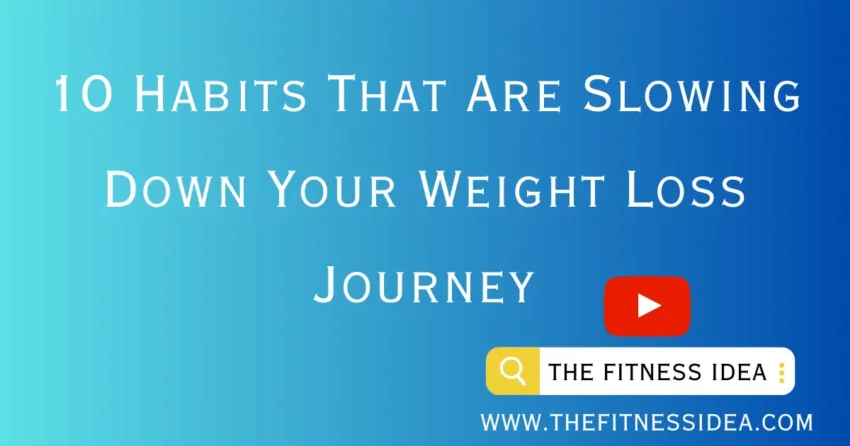Embarking on a weight loss journey requires dedication, perseverance, and a keen awareness of the factors that can either propel you forward or hold you back. While the path to shedding those extra pounds is unique for each individual, there are certain habits that can significantly impede your progress. In this guide, we will delve into ten common habits that might unknowingly be sabotaging your weight loss efforts. From mindless snacking to inadequate sleep, these habits can create roadblocks on your way to achieving your fitness goals. By understanding these obstacles and learning how to overcome them, you can regain control of your weight loss journey and set yourself up for success. So, let’s explore these habits and discover how to break free from their grasp, unlocking the full potential of your transformational journey.
10 Habits That Are Slowing Down Your Weight Loss Journey
Not eating enough protein: Protein is necessary for weight loss since it helps you feel full and satisfied. When you don’t eat enough protein, you’re more likely to snack on unhealthy foods throughout the day.
Skipping meals: Skipping meals might slow your metabolism and make it more difficult to lose weight. When you miss meals, your body enters a state of famine and begins to preserve energy. In the long run, this can contribute to weight gain.
Eating processed foods: Processed foods are often high in calories, unhealthy fats, and sugar. They may also be deficient in nutrients, making weight loss more difficult.
Drinking sugary drinks: Sugary drinks, such as soda, juice, and energy drinks, are loaded with calories. They can also contribute to weight gain and other health problems.
Not drinking enough water: Staying hydrated is critical for losing weight. When you’re dehydrated, your body holds onto water weight. Drinking plenty of water can help you to lose weight and improve your overall health.
Not getting enough sleep: When you don’t get enough sleep, your body creates extra cortisol, a stress hormone. Cortisol can make it more difficult to lose weight and can potentially cause weight gain.
Not exercising regularly: Exercise is essential for weight loss and overall health. Exercise both burns calories and builds muscle. Muscle tissue burns more calories than fat, so the more muscle you have, the easier it is to lose weight.
Stressing out: Stress can lead to unhealthy eating habits and weight gain. When you’re stressed, your body releases cortisol, which can make you crave sugary foods and make it harder to lose weight.
Not tracking your progress: Tracking your progress is important for staying motivated and on track. When you track your weight, calories, and exercise, you can see how you’re doing and make adjustments to your plan as needed.
Giving up too easily: Weight loss is a journey, not a destination. Along the way, there will be ups and downs. It’s important to stay positive and keep moving forward, even when you experience setbacks.
FAQs: 10 Habits That Are Slowing Down Your Weight Loss Journey
Q: What are some common habits that can slow down my weight loss journey?
A: Several habits can hinder your weight loss progress, such as excessive snacking, lack of regular exercise, inadequate sleep, and consumption of sugary or high-calorie beverages.
Q: How does excessive snacking affect my weight loss efforts?
A: Excessive snacking, especially on unhealthy and calorie-dense foods, can lead to a surplus of calories in your diet. This can counteract the calorie deficit necessary for weight loss and result in slower progress.
Q: Is it important to watch my portion sizes?
A: Yes, portion control plays a crucial role in weight loss. Even healthy foods can contribute to weight gain if consumed in large portions. Being mindful of portion sizes helps you manage your calorie intake.
Q: Can lack of regular exercise really impact weight loss?
A: Absolutely. Regular physical activity helps burn calories and increases your metabolism. Without exercise, your body might struggle to create the calorie deficit needed for effective weight loss.
Q: How does inadequate sleep relate to weight loss?
A: Poor sleep can disrupt hormones that regulate appetite and metabolism, leading to increased cravings and overeating. Aim for 7-9 hours of quality sleep per night to support your weight loss journey.
Q: Are all carbohydrates bad for weight loss?
A: No, not all carbohydrates are bad. Opt for complex carbohydrates like whole grains, fruits, and vegetables, while limiting refined carbs and sugary foods that can spike blood sugar levels and hinder weight loss.
Q: What role does hydration play in weight loss?
A: Staying hydrated can aid in weight loss by promoting satiety and preventing overeating. Drinking water before meals can help you consume fewer calories and manage your appetite.
Q: Can stress affect my weight loss progress?
A: Yes, chronic stress can lead to emotional eating and hormonal changes that promote fat storage. Incorporating stress-reduction techniques like meditation and yoga can support your weight loss efforts.
Q: How do sugary and high-calorie beverages impact weight loss?
A: Beverages like sugary sodas, energy drinks, and high-calorie coffee beverages can contribute significant calories without providing a feeling of fullness. Opt for water, herbal tea, or low-calorie alternatives to support your weight loss.
Q: Is it necessary to completely avoid all treats during weight loss?
A: It’s not necessary to eliminate treats entirely, but moderation is key. Occasional treats can be enjoyed, but regularly indulging in high-calorie or unhealthy foods can impede your progress.
